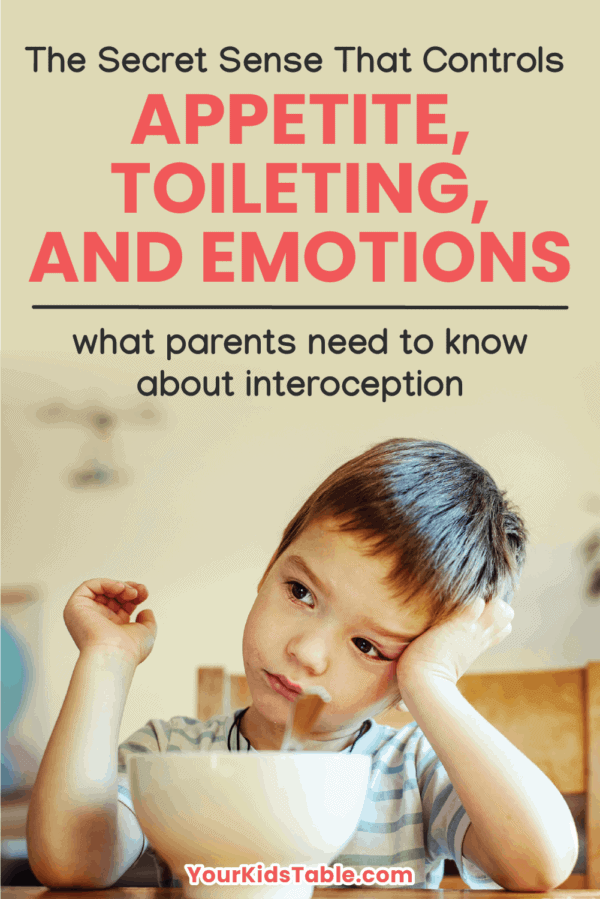Finally understand why your child has trouble with appetite, eating too much, toileting, or big emotions. It’s all related to interoception, and I’m teaching you 3 ways to help your child that struggle in these areas.
Not only was her daughter a picky eater. She never seemed hungry. It was like she had no appetite at all and could go for hours on end without eating a thing…
Their son was a bright boy, but he could not get the hang of toilet training. At 6 years old, he would still have accidents if they didn’t remind him to use the bathroom. It was like he totally forgot…
Another child struggled to understand his emotions. He would feel something strongly, but couldn’t label if he was angry or happy, anxious or sad. This confusion often made him feel uneasy and he’d often lash out at others for no reason…
As strange as it seems, there is an explanation to each of these scenarios, it’s the 8th sense: Interoception
What is Interoception?
Scientist Charles Sherrington first proposed the concept of Interoception in the early 1900’s, but only in the last decade has it become more of a mainstream consideration for children and adults that are managing some unique challenges.
While more and more occupational therapists and other professionals are learning about interoception and it’s implications, It’s likely that, as a parent, you’re just learning about interoception for the first time.
So, what is it?
Interoception is our sense of internal sensations, all of them. This includes, but isn’t limited to:
- appetite
- fullness/satiation in eating
- the need to use the bathroom
- pain (stomach aches, head aches, sore muscles)
- sexual arousal
- emotions

Signs and Symptoms of Poor Interoception…
Some children (and adults) don’t seem to process interoceptive sensations well. This can cause all sorts of problems like:
- Overeating
- Under eating because of a lack of appetite
- Going to the bathroom constantly
- Frequent toileting accidents because of rarely using the bathroom
- Not feeling or reporting injuries or bodily aches and pain
- Intensely feeling pain, and being uncomfortable a lot of the time
- Experiencing big emotions all the time
- Seeming apathetic because feelings are perceived
What if Your Child Has Difficulty with Interoception?
As you read through the list above, you can imagine the consequences of each problem. For example, if your child has no appetite, and they under eat, they may not be getting all the nutrition they need.
Or, if they’re constantly over eating because they never process that sensation of feeling full, they can make themselves sick and struggle with weight problems.
Not noticing those internal signals to use the bathroom can lead to chronic constipation which can fuel picky eating. There’s a huge ripple effect. That boils down to, what’s now being called, interoceptive awareness.
Interoceptive awareness is accurately being aware of the many internal sensations you might experience from appetite to toileting needs to emotions.
Increasing interoceptive awareness is the goal for kids that struggle with responding appropriately to internal sensations. All interoceptive awareness happens in the brain, it’s a neurological process just like all other aspects of sensory processing. That means it can intentionally be improved!

3 Ways to Encourage Interoceptive Awareness in Kids
How do you improve interoceptive awareness? There are a variety of beneficial interoception activities which are part of our RISE with Sensory program, but I’d like to share 3 quick things you can start doing today.
For any interoceptive activity to be successful, you’ll want to keep 2 things in mind:
First, use them consistently. Trying any of the strategies below just once or twice probably won’t put that much of a dent in your child starting to notice their hunger or toileting signals, but using them several times a week over several weeks or a longer period of time can have a big impact.
Second, a child should never feel bad about what they’re sensing or experiencing. As parents, we’re so desperate to have our kids overcome the challenge they’re dealing with that we can sometimes force conversations. Be pushy. Or, pressure them for responses. It’s critical to focus using the following 3 strategies in a light, open way.
Strategy #1: Model and describe how YOU are feeling
Most of us totally take for granted what it feels like to be hungry, full, use the bathroom, or have a headache. For a child with poor interoceptive awareness, they may not have a clue. Simply taking the opportunity to neutrally describe how you’re feeling in the normal course of your day can serve as an excellent model and start to teach your child to pay attention to their sensations.
Some examples of statements you could make as they arise are:
- Gosh, I’m hungry. My stomach is hurting and sort of feels like it’s grumbling. That’s how I know that I’m hungry.
- Oh, I need to go pee. My lower stomach feels full and I feel like I need to let go.
- I have a headache. My head hurts, it sort of feels like a hammer is banging inside my head
You don’t need to use my words. Use your own words, and explain it as simply as possible.

Strategy #2: Ask your child how they are feeling at specific times
Once you’ve used strategy #1 for at least a few days, then you could ask your child questions at times that are relevant to the areas they need to increase interoceptive awareness. For instance, if they have trouble recognizing their appetite, you’d ask them how their stomach feels after they hadn’t eaten in while.
Or, if they just went to the bathroom and think they need to go again, you could ask them: “How is your body feeling that is making you think you need to go to the bathroom?”
The point isn’t to tell them how they should feel, but to get them to stop and think inwardly on the sensations they are experiencing so that they can connect that to their actions. This is fostering a sense of mindfulness.
Some other examples of questions you might ask:
- Does your stomach feel different after you ate?
- Does your stomach feel different after you used the bathroom?
- You fell really hard on your knee. How does it feel right now?
- How do you know when it’s time to go #2?
- You seem to be uncomfortable, can you close your eyes and try to think about your stomach/head/chest is in pain?
You can ask any of the questions above, even if your child doesn’t struggle with that particular activity, because any awareness of internal sensations is good practice. But, you’ll want to focus on the questions that target the areas they need help with.
Be careful not to ask these questions too often, everyday could get annoying for some kids, which will only set them up for avoiding your questions. But, you do want to be somewhat consistent. Aim for at least a few times a week and if your child tolerates it, you can try daily.
Strategy #3: Make a game out of describing emotions
One other fun way you can work on increasing interoceptive awareness is to play the emotion game. Somebody names an emotion and then everybody describes what the emotion feels like. This is perfect for around the dinner table or on a car ride.
It’s also meant to be casual, and there are no wrong answers.
Here’s some examples of emotions and possible answers to give you an idea, but any answer is correct:
- Happy: tight cheeks from smiling, want to jump, heart feels good
- Angry: hot, strong, want to hit something
- Sad: cold, want to be somewhere cozy, wet eyes from crying
- Tired: sore eyes, heavy muscles
- Excited: full of energy, bright, racing heart
The more you describe emotions and feelings, the more your child will think about their emotions and start to connect them to the sensations they’re experiencing
All of these activities can be adapted for toddlers as well, but you’ll want to use simpler explanations and questions to help them become aware of those internal sensations.
Join Me for the Free Sensory Workshop
Your timing couldn’t be better join us for the free workshop 3 Secrets to Improve Calm and Focus with Sensory Activities, I’d hate for you to miss it because it all applies to interoception, as well as the other senses!
Make sure you grab a seat:
Click here to get the free workshop
More on the 8 Senses
The Secrets of the Mighty Tactile Sense Revealed
45 Essential Vestibular Activities and Input Ideas
Powerful Proprioceptive Activities That Calm, Focus, Alert
What If Your Kid Isn’t Listening Because of Auditory Processing Difficulties?
Alisha Grogan is a licensed occupational therapist and founder of Your Kid’s Table. She has over 15 years experience with expertise in sensory processing and feeding development in babies, toddlers, and children. Alisha also has 3 boys of her own at home. Learn more about her here.

Your articles are the best. I’ll never forget finding an article back in 2017 that was the light bulb moment about my son. Now here I am, 7 years later, still reading your articles and getting such practical advice on how to be the best mom I can be for my sons.
Wow, what kind words, Kelsey! So glad to hear you’ve found these resources helpful and thanks for sticking around for so many years! I will make sure Alisha is made aware of this feedback. You’re doing an amazing job, we are happy to help!
Best,
Laura
Your Kid’s Table team member
Great information. Can you recommend some books and resources on this topic?
Thankyou alot for such a useful and latest information. Great job doing. This is so insightful.
Hi Anita! Thank you for reaching out and sharing your feedback! So glad you found this post helpful. Thank you for your support 🙂
Best,
Kalyn